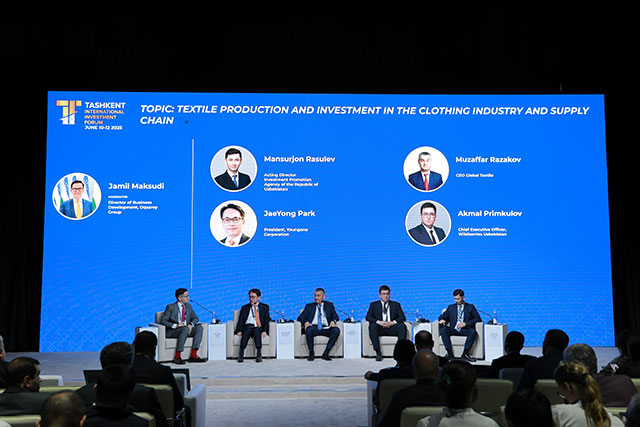
Uzbekistan Aims for Global Textile Leadership with Focus on Technology, Export, and Digital Trade
Uzbekistan Aims for Global Textile Leadership with Focus on Technology, Export, and Digital Trade
Tashkent, Uzbekistan (UzDaily.com) — On 10 June, the Tashkent International Investment Forum hosted a panel session focused on investments in textile manufacturing, garment production, and logistics chains. The session highlighted Uzbekistan’s rich cultural and industrial heritage in the textile sector, while exploring new opportunities for growth and modernization.
Participants discussed strategies to boost the global competitiveness of Uzbekistan’s textile industry, enhance logistics efficiency, and ensure environmental sustainability. Emphasis was placed on improving product quality through foreign investment, adopting advanced technologies, expanding export markets, and supporting local manufacturers.
Akmal Primkulov, Director of Wildberries Uzbekistan, spoke about the ongoing digital transformation in modern retail:
“We’re witnessing a radical shift in the structure of commerce. At Wildberries, we’ve built a digital ecosystem that directly connects producers with millions of buyers worldwide — eliminating geographical and technological barriers. For Uzbek companies, this is a massive opportunity.”
He noted that COVID-19 was a catalyst for e-commerce growth, and today offers a rare chance for full integration into the global digital economy.
“It’s not just about selling goods — it’s about transforming entire business models,” he said.
Primkulov emphasized that in the new digital reality, speed, reliability, and transparency are paramount.
“Companies still relying on outdated methods risk being left behind. Adapting to 21st-century standards is no longer optional — it’s vital.”
He also highlighted the importance of branding:
“Uzbekistan has unique creative and artisanal potential that can be promoted internationally. We aim to prove that ‘Made in Uzbekistan’ products can compete with global brands like Zara. Those who adapt to digital trade today will be market leaders within five years.”
Jae Yong Pak, President of South Korea’s Youngone Corporation, stressed the need for Uzbekistan to move beyond its traditional reliance on cotton and natural fibers:
“Yes, Uzbekistan is known for its textiles and raw materials. But to leap forward rather than grow incrementally, the country must invest in high-tech areas, such as synthetic fiber production — a critical part of industry modernization.”
He also underlined the importance of human capital development:
“Without a skilled workforce and a strong production culture, there can be no consistent quality or efficiency. Real industrial transformation happens on the factory floor — that’s where growth or stagnation is determined. My advice: don’t fixate on cotton. Look to innovation and workforce development — that’s the foundation of sustainable global competitiveness.”
Mansurjon Rasulov, Acting Director of Uzbekistan’s Agency for Attracting Foreign Investment, called for a broader investment perspective on the textile sector.
“When we present Uzbekistan to potential investors — whether at forums or roadshows — we often highlight the obvious advantages: low labor costs, affordable energy, and a large workforce. But other markets offer that too. So, what makes Uzbekistan unique?”
He noted that until 2017, Uzbekistan was largely closed to the outside world, with total foreign investment at under $3 billion. Today, that figure stands at $35 billion.
“That’s a tenfold increase. Yes, there was skepticism at first. But eight years of consistent and active reforms is a track record that speaks for itself.”
Rasulov pointed to another strategic milestone ahead: Uzbekistan’s accession to the World Trade Organization (WTO), expected by 2026, as instructed by the President.
“This will be a game-changer. Those who invest in Uzbekistan before this turning point will reap the greatest benefits. The historic window of opportunity is open — and now is the time to act.”